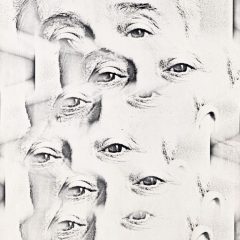I went back and re-read the brief.
Two points in particular stood out for me:
– “Approach the intervention as a creative unsettling of your own practice in partnership with your students and/or colleagues”
– “Notice and reflect on your positionality, embodiments, and practices as a researcher”
Prior to doing the PgCert I would say I view myself as a tutor in terms of wanting to impart quite core principles of typography, that could be described as fundamental skills, tools, knowledge that can then be used by students to enhance their work and as a ‘jumping off point’ for their own ideas, experiments and explorations of the subject.
Since reading more about decolonisation, attending Anoushka’s workshop and speaking to colleagues and tutors, my understanding of what I think of as core and fundamental knowledge comes into question somewhat. Decolonisation asks us to reconsider what we might of think of as ‘universal truths’ or knowledge of a subject as regional, and part of a varied global perspective.
My big questions about my teaching practice are about encouraging students to question what we think of as universal knowledge but to also not discard it as somehow representative of colonialism, capitalism, etc.
I find this term ‘creative unsettling’ really interesting and have seen how this has started to happen in the first two units of the PgCert and intend to develop this more fully on the ARP.
Being open to this unsettling is daunting as it’s in my nature to use my knowledge and expertise as a way to give me confidence in teaching, so undoing this a bit like exploring the unknown for me as a tutor.
The idea of doing this “in partnership with your students and/or colleagues” is also interesting and perhaps key to a decolonial approach, as it would be difficult if not impossible for me to try and become an expert in many global approaches to graphic communication design and typography, so it seems essential to work with the students to explore this. The fact that at CSM we have a very international cohort is a real advantage here also.
I’d like to develop an intervention that explores diversity, racial/social justice, deconialism, through a typography project of some kind.
For me it’s interesting to consider what decolonialism can bring not only to the institution but also to the design industry, and how can my teaching encourage both of these things.
I’m also interested in what happens to so-called colonial knowledge. In some of the rhetoric of decolonialism there is a kind of heroic excitement in radically changing the landscape of how design is taught. But I’m also conscious that in hundreds of years of practice, there is knowledge, skills, techniques that are valid, useful, fundamental in design (and of course other fields) that we shouldn’t just abandon. The question for decolonisation is how do we avoid a situation where anything goes and can be questioned? How and what do we teach from colonial knowledge sources?
When attending Anoushka’s workshop in particular, I was reminded of the work and ideas of postmodernism, which seemed similar to some of the ideas she was presenting as decolonial (non-hierarchical etc). There’s an aspect of postmodern typography that just lead to unreadable communications that call into question everything about legibility, hierarchy, structure, composition etc.
